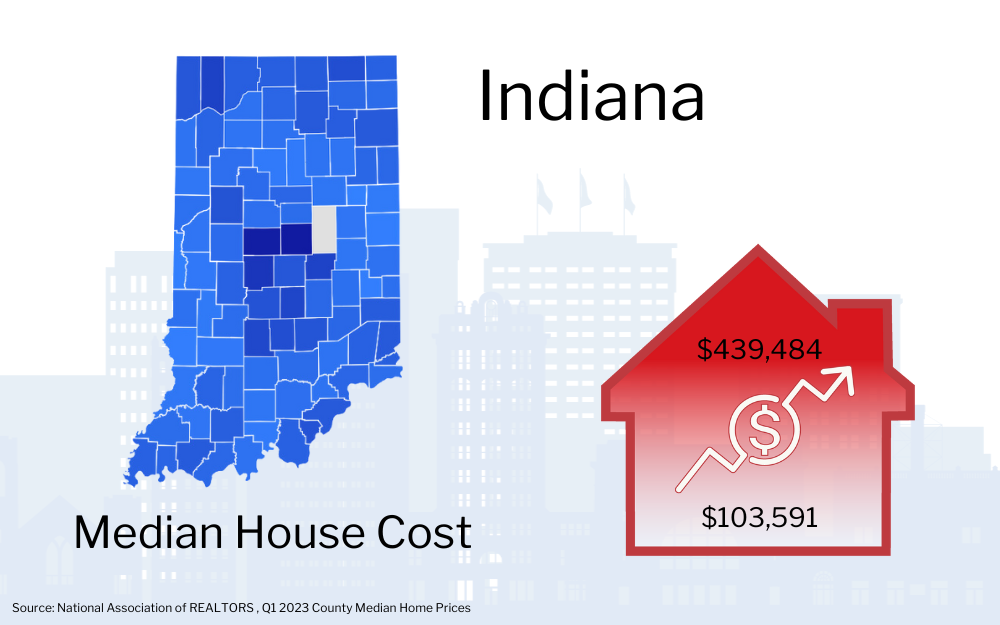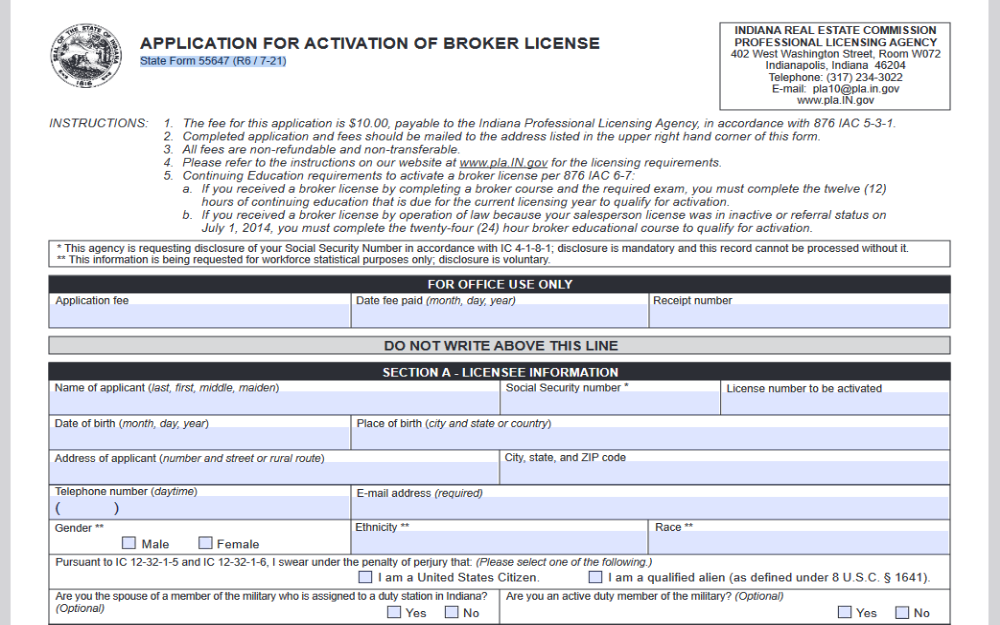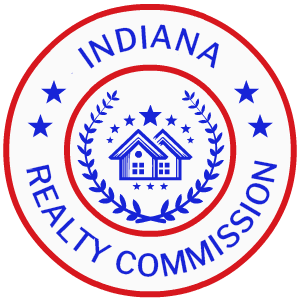
Achieving your dreams of becoming a licensed real estate agent in Indiana requires passing a licensing exam administered by PSI and the Indiana Real Estate Appraiser Licensure & Certification Board.
Real Estate Exam Summary
The Indiana Real Estate Licensing Exam covers state real estate requirements and national regulations. There are 130 questions in all, with 50 state questions and 80 national questions.
You will have four hours to complete the entire exam. Ninety of those minutes are for the state questions, and the other 2.5 hours are for the national questions.
What’s Required?
PSI requires two forms of ID: a government-issued ID with a photograph and signature and your preprinted legal name and signature. You can use a passport or driver’s license as one form of identification, but both must be valid.
You must also have a state appraisal board approval letter to take the exam. Please do not make a copy of this but present the original.
If you must retake the exam because you didn’t pass, you need the letter (or another one) to take it the second time.
PSI also recommends showing up with 30 minutes to spare so you don’t rush through the door and can get into a concentrated mindset ahead of the exam.
Sample Questions
Here is a sample of the content on the Appraiser Trainee exam.
- Influences on real estate value (five percent of exam questions)
- Social
- Legal and government
- Economic
- Environmental and physical
- Legal considerations in appraisals (eight percent of exam questions)
- Transfer of title
- Legal descriptions
- Forms of property ownership
- Legal interests and rights
- Limitations on real estate ownership
- Personal vs. real property
- Real property vs. real estate
- Types of value (five percent of exam questions)
- Assessed value
- Value in use
- Investment value
- Cost
- Price
- Market value
- Insurable value
- Economic principles (nine percent of exam questions)
- Surplus productivity
- Supply and demand
- Substitution
- Decreasing and increasing returns
- Contribution
- Conformity
- Competition
- Change
- Balance
- Anticipation
- Real estate markets and analysis (10 percent of exam questions)
- Real estate financing
- Role of capital markets and money
- Absorption analysis
- Characteristics of real estate markets
- Valuation process (10 percent of exam questions)
- Appraisal reports
- Final value estimates and reconciliation
- Limitations and application of approach to value
- Analysis of best use and highest
- Analysis and collection of data
- Defining the problem
- Property descriptions (12 percent of exam questions)
- Basic design and construction
- Improvement description
- Site description
- Highest and best use analysis (12 percent of exam questions)
- Consistent use rule
- Interim use
- As improved
- As if vacant or vacant site
- Four tests
- Appraisal statistical concepts (five percent of exam questions)
- Standard deviation
- Range
- Mode
- Median
- Mean
- Approaches to value (12 percent of exam questions)
- Site value
- Sales comparison approach
- Income approach
- Cost approach
- Uniform Standards of Professional Appraisal Practice (USPAP) (12 percent of exam questions)
Here are some sample questions courtesy of PSI.
- If a homeowner bought tract subdivision lots 20 years ago and added a single-unit dwelling to one lot and then left the second as a side yard, and they choose to add a small home to the vacant side of the lot and use the current home as a rental, what is the correct term for the second yard?
A.) Vacant site
B.) Underutilized site
C.) Surplus land
D.) Excess land
The answer is D, excess land.
- If dwelling occupants have a life estate granted to them by an adult child, what is that adult child’s interest in the property?
A.) Trustor
B.) Trustee
C.) Remainder
D.) Life tenant
The answer is C, remainder.
5-Step Process for Filing Your Indiana Real Estate Records Online License Application
The process of obtaining and filing your Indiana real estate license requires five steps. Here’s how to become a broker.
Step 1: Educational Requirement
Do you have to go to school to be a real estate agent? Yes, that’s the first requirement of obtaining a license.
Enroll in a broker pre-licensing real estate course approved by the state of Indiana. You can select from many license packages when browsing schools for real estate licenses, some offering online education and others offline.
Hybrid options might also be available.
The course completion time is 90 hours. Most courses are split three ways, with 30 hours dedicated to each overarching topic.
You must take and pass a test after each section of the course.
In addition to learning about the requirements to become a real estate broker in Indiana, you will also gain valuable insights into the course material you will be tested on to receive your license.
Step 2: Take the Exam
After graduating from your accredited Indiana real estate program, it’s time to test your knowledge. The Indiana licensing exam has a 75 percent pass rate,1 so most aspiring brokers who take it for the first time will pass.
You can always test again if you fail, but the fee to take the exam is $53 per attempt. Test prep will help you prime yourself for the exam.
Remember to get a good night’s rest the night before and eat a nutritious meal before you take your exam.
PSI administers the Indiana Real Estate Broker Exam online or in person. Take the test in a setting that’s more convenient for you.
Step 3: Work With a Managing or Sponsoring Broker
You passed the Indiana Real Estate Broker Exam. While now is an exciting time, temper that, as there’s still more work to be done before you can begin assisting clients with buying and selling property.
You must work with a managing or sponsoring broker to earn your license. You can choose the broker you affiliate with, so select carefully.
As you narrow your choices, consider how successful the brokerage is, whether advancement opportunities exist, the availability of benefits, how much support and training they offer, and if they have a positive reputation. You should also carefully review their commission structure.
Step 4: Complete State Form 55647 (R6 / 7-21)
Filing an Indiana real estate records license application requires you to complete State Form 55647 R6 / 7-21, Application for Activation of Broker License.2 Here are the steps required to do so.
Access the form using the link above. You will be redirected to a PDF form with fields to which you can type your responses.

Complete the form, beginning with Section A: Licensee Information. Include your first, middle, last, and maiden name (as applicable).
Type your social security number, Indiana real estate number (that has yet to be activated), date of birth (day, month, and year), and place of birth, including the city, state, or country.
Input your address, including the street name and number, city, state, and zip code. Next, include your telephone number, email address, gender, ethnicity, and race.
Check off whether you’re a United States citizen, an active duty military member, or a military member or spouse working at a duty station in Indiana.
Section B: Broker Information requests the broker name, broker license number, company license number, broker company name, business telephone number, business address, and date and signature of the managing broker.
Section C: Continuing Certificates, you should scan and attach (or physically attach) all continuing education certificates for your application to be processed.
Section D: Reactivation Questions, asks the following questions, with answers to check yes or no to each:
- “Has disciplinary action ever been taken regarding any professional license, certification, registration, or permit that you currently hold or have previously held?”
- “Has any complaint been filed against you in the State of Indiana, or in any other state, regarding any professional license you currently hold or have previously held, or have you practiced real estate or appraising as defined by IC 25-34.1 without a license?”
- “Have you ever been denied a license, certification, registration or permit to practice real estate or any other profession in this or any other state?”
- “Except for minor violations of traffic laws resulting in fines, and arrests or convictions that have been expunged by a court,
(1) Have you ever been arrested;
(2) Have you ever entered into a prosecutorial diversion or deferment agreement regarding any offense, misdemeanor, or felony in any state;
(3) Have you ever been convicted of any offense, misdemeanor, or felony in any state;
(4) Have you ever pled guilty to any offense, misdemeanor, or felony in any state; or
(5) Have you ever pled nolo contendere to any offense, misdemeanor, or felony in any state?”
If you respond yes to any of the above questions, your application isn’t necessarily disqualified. You must include a notarized and signed statement detailing the case, including court records, disposition information, the violation, where it happened, and when.
You can lose your license if you’re dishonest about any of the information in Section D.
Section E: Application Information requires your date and signature if you swear on the honesty of the statements in the form. Then, you must affirm that you’ve read the Authorization for Release of Information, dating, and signing your name.
Double-check the information in your form, confirming its accuracy, then save and download it to a secure file on your computer.
Pay the associated fee for the activation of your broker license in Indiana. The cost is $10.
You can send the check to the Indiana Real Estate Commission Professional Licensing Agency at 402 West Washington Street, Room W072, Indianapolis, Indiana 46204.
You can reach the Indiana Real Estate Commission Professional Licensing Agency by email at [email protected] or by phone at 317-234-3022.
Send your application and await confirmation from the Indiana Real Estate Commission Professional Licensing Agency.
Step 5: Take a Broker Post-Licensing Course
Although not an immediate requirement, you must take a broker post-licensing course approved by the state up to two years after receiving your real estate license. This continuing education requirement keeps your real estate knowledge sharp.
The CE must be for at least 30 hours.
Indiana Real Estate Records Online Fee Structure
The fee structure for Indiana real estate records is straightforward and low-cost, costing the aforementioned $10. No refunds are available.
Applying for National Association of Realtors® (NAR) Membership, If You Choose
As a bonafide Indiana real estate license holder, you can now consider joining the National Association of Realtors® or NAR.3 This trade association is open to US realtors®.
It’s the biggest trade association of its kind in the nation, with over 1.5 million members. Joining NAR isn’t free, with the costs set at $150 per member in 2023.4
The prices are set to increase in 2024 to $156 for one year of membership.
Brokers must also pay NAR dues, calculated by how many non-member salespeople their office has.
Joining NAR has many benefits, including savings on marketing and insurance, property reports and insights, exclusive social media content, and resources for making yourself a better realtor®.
Membership is optional, so weigh the costs against the benefits before deciding if becoming a NAR member is right for you.
What’s the Estimated Timeframe for the Real Estate Application Process?
The real estate application process in Indiana can take upward of a year. You must commit 90 hours to a pre-licensing course, then you can take the Indiana Real Estate Broker Exam.
You have a year to do this, but you must pass the exam within that 365-day timeframe.
Then, you must send in your application and wait for that to process and commit to CE for 30 hours.
How long it takes you to apply for a real estate license requires considering other factors. For example, if you’re working full-time and also working to become a real estate broker, you might take the full year to complete each process.
However, if you’re eager to make real estate agency your full-time career, you might move through the processes faster. Even then, you can’t help how long the required course loads are, nor can you affect processing times for paperwork.
References
1Rodriguez, K. (2023, September 5). Kevelyn Rodriguez. State Requirement. Retrieved October 30, 2023, from <https://staterequirement.com/real-estate/indiana-real-estate-license/>
2Indiana Real Estate Commission Professional Licensing Agency. (2023). Indiana Application For Activation Of Broker License. State of Indiana. Retrieved October 30, 2023, from <https://www.in.gov/pla/files/RE-Activation-application.pdf>
3National Association of REALTORS®. (2023). Empowering REALTORS® to achieve their real estate ambitions. National Association of REALTORS® Homepage. Retrieved October 30, 2023, from <https://www.nar.realtor/>
4National Association of REALTORS®. (2023). REALTORS® Membership Dues Information. National Association of REALTORS®. Retrieved October 30, 2023, from <https://www.nar.realtor/membership/dues-information>
5Indiana Real Estate Commission Professional Licensing Agency. (2024). Application For Activation Of Broker License. Indiana Real Estate Commission Professional Licensing Agency. Retrieved April 15, 2024, from <https://www.in.gov/pla/files/RE-Activation-application.pdf>
